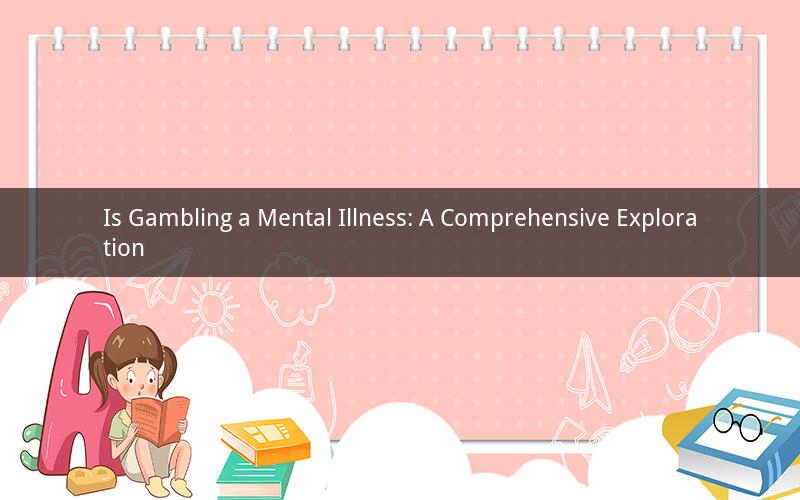
Introduction:
Gambling has been a topic of debate for centuries, with many questioning whether it can be classified as a mental illness. This article delves into the various aspects of gambling, its potential link to mental health issues, and the ongoing discussions surrounding this controversial topic.
1. Understanding Gambling:
Gambling is the act of betting something of value on an event with an uncertain outcome, with the primary intention of winning additional money or material goods. It can take various forms, including sports betting, lottery, casino games, and online gambling.
2. The Link Between Gambling and Mental Health:
While not all gamblers experience mental health issues, research indicates that there is a significant connection between gambling and mental illness. Some common mental health conditions associated with gambling include:
a. Problem Gambling: Characterized by an inability to control gambling behavior, leading to negative consequences in various aspects of life, such as finances, relationships, and work.
b. Depression: Studies have shown that individuals with depression are more susceptible to developing gambling problems. Conversely, problem gambling can exacerbate symptoms of depression.
c. Anxiety: Anxiety disorders are often associated with gambling, as individuals may engage in gambling as a means to alleviate their anxiety.
d. Substance Abuse: There is a strong correlation between gambling and substance abuse, with individuals struggling with both conditions often experiencing worsened symptoms.
3. The Role of Biology and Genetics:
Research suggests that genetics and biology play a role in the development of gambling problems. Certain individuals may have a predisposition to develop addictive behaviors, including gambling. Additionally, brain imaging studies have revealed differences in brain structure and function between gamblers and non-gamblers.
4. The Impact of Social and Environmental Factors:
Social and environmental factors can significantly influence gambling behavior. Peer pressure, exposure to gambling through media, and the availability of gambling opportunities can contribute to the development of gambling problems.
5. Treatment and Prevention:
Addressing gambling-related mental health issues requires a comprehensive approach. Treatment options may include therapy, support groups, and medication. Prevention strategies involve raising awareness, implementing responsible gambling policies, and promoting healthy lifestyles.
6. Public Perception and Stigma:
The stigma surrounding gambling and mental health issues often hinders individuals from seeking help. This stigma can lead to a lack of understanding and support, making it challenging for those affected to overcome their struggles.
7. The Need for Research and Policy:
Further research is necessary to better understand the complexities of gambling and mental health. Policymakers should also consider implementing evidence-based strategies to address gambling-related issues and support those affected.
Questions and Answers:
1. Q: Can anyone develop a gambling problem?
A: Yes, anyone can develop a gambling problem, regardless of age, gender, or background. Certain factors, such as genetics, environment, and mental health, may increase the risk.
2. Q: Is problem gambling a mental illness?
A: While problem gambling is not classified as a mental illness, it is recognized as a disorder by the American Psychiatric Association (APA) and other organizations. It is often associated with mental health issues, such as depression and anxiety.
3. Q: How can I identify if someone has a gambling problem?
A: Look for signs such as secretive behavior, increased financial stress, neglect of responsibilities, and changes in mood or personality. If you suspect someone has a gambling problem, encourage them to seek professional help.
4. Q: Can therapy help with gambling problems?
A: Yes, therapy can be an effective treatment for gambling problems. Cognitive-behavioral therapy (CBT) is particularly beneficial in addressing gambling-related issues, as it helps individuals develop healthier coping mechanisms and change negative thought patterns.
5. Q: What can be done to prevent gambling-related problems?
A: Prevention strategies include raising awareness about responsible gambling, implementing stricter regulations on gambling opportunities, and promoting healthy lifestyles. Additionally, individuals can educate themselves about the risks of gambling and seek support when needed.